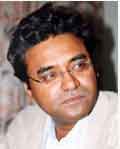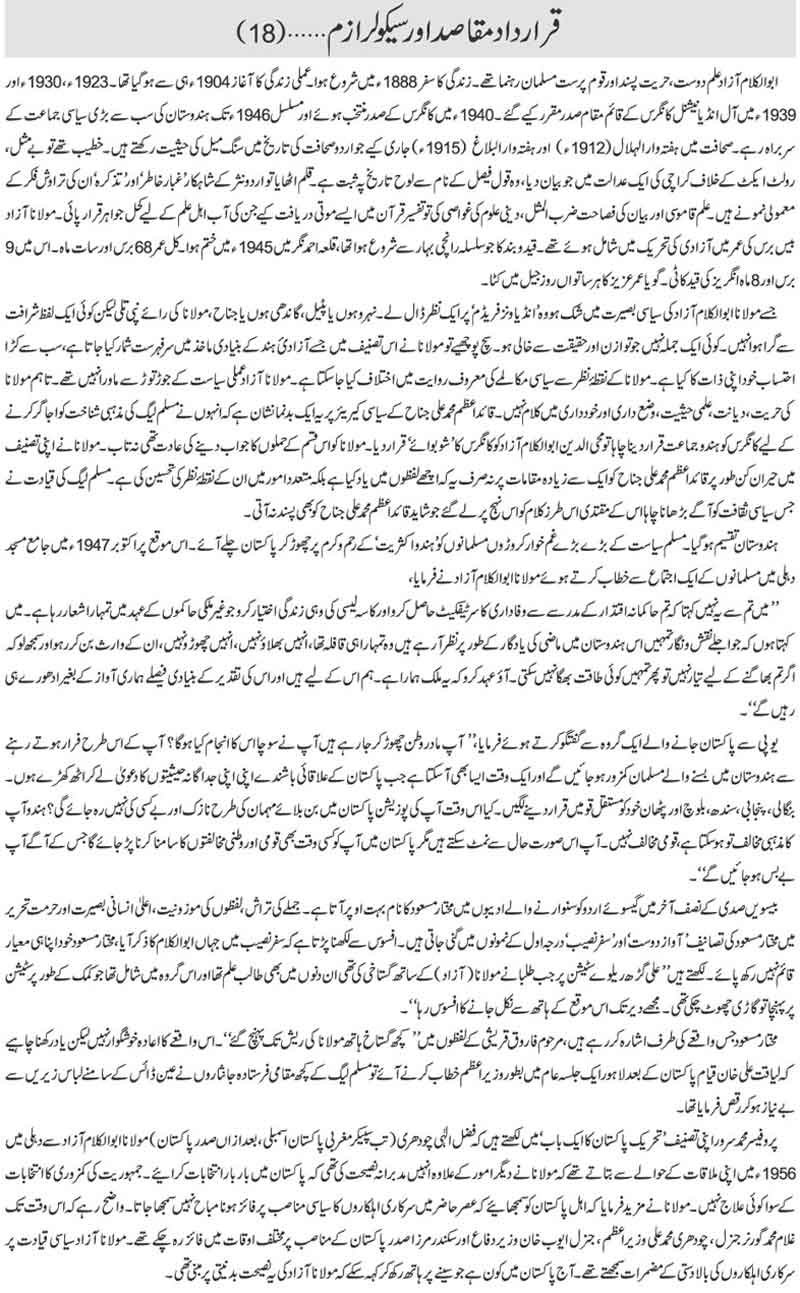Objectives Resolution and secularism-Part-18
 The
founder of Pakistan, Mohammad Ali Jinnah, wanted a separate country for Muslims
but his political upbringing in a pluralist society prevented him from declaring
Pakistan an Islamic state. Contrary to the general perception in India, Mr
Jinnah was arguably a secular and liberal Muslim who wanted a Pakistan where all
citizens would be equal in the eyes of the constitution irrespective of their
religion, caste or creed. But leaders like Liaqat Ali Khan and power hungry
opportunistic religious leaders wanted it to be otherwise. In this beautifully
written series titled, "Objectives Resolution and Secularism", Mr Wajahat Masood
delves deep into history to find out how Jinnah's dream of a secular and
democratic Pakistan was shattered. –Editor
The
founder of Pakistan, Mohammad Ali Jinnah, wanted a separate country for Muslims
but his political upbringing in a pluralist society prevented him from declaring
Pakistan an Islamic state. Contrary to the general perception in India, Mr
Jinnah was arguably a secular and liberal Muslim who wanted a Pakistan where all
citizens would be equal in the eyes of the constitution irrespective of their
religion, caste or creed. But leaders like Liaqat Ali Khan and power hungry
opportunistic religious leaders wanted it to be otherwise. In this beautifully
written series titled, "Objectives Resolution and Secularism", Mr Wajahat Masood
delves deep into history to find out how Jinnah's dream of a secular and
democratic Pakistan was shattered. –Editor
Speaking to a group of Muslims of UP going to
Pakistan he said, “You are leaving your motherland. Did you think about the
repercussions? If you continue to flee in this way, the Muslims of India will
become weak and the day is not far away when regional inhabitants will rise to
claim their separate identities. Bengalis, Punjabis, Sindhis, Balochis and
Pathans would declare themselves independent nationalities. Wouldn’t you be then
in a helpless and delicate position like that of an unwanted guest in Pakistan?
The Hindus may be your religious opponent but he is definitely not your national
opponent. You can cope with them but in Pakistan you might face national and
regional opposition which will make you feel left in the lurch.” – Maulana Azad

By Wajahat Masood
(Translated from Urdu by Sohail Arshad)
Maulana
Abul Kalam Azad was a litterateur, and a patriotic and nationalist Muslim
leader. The journey of his life started in 1888 and his professional life
started in as early as 1904. He was appointed as the acting president of All
India National Congress in 1923, 1930 and 1939. He was elected the President of
the Congress in 1940 and remained the chief of the largest political party of
India till 1940. As a journalist, he published the weekly Al-Hilal (1912) and
the Al-Balagh (1915) which have become the milestones in Urdu journalism. As an
orator, he was unrivalled. The speech he delivered against the Rowlatt Act in a
Karachi Court has gone down into history as “Qaul-e-Faisal”. When he weilded his
pen, he produced the intellectual masterpieces of Urdu prose titled
“Ghubar-e-Khatir and Tazkerah. His knowledge was all encompassing and his style
and diction was unique. When he delved deep into religious sciences, he produced
gems of knowledge in the form of exegesis of the Quran.
Maulana
Azad joined the freedom movement at the age of twenty. The series of
incarcerations that started in Ranchi, Bihar (now Jharkhand), ended at Qila
Ahmad Nagar in 1945. His life span was 68 years and 7 months of which he spent 9
years and 8 months in British custody. He spent every seventh day of his
precious life in prison, that is.
If
anyone has any doubt about the political wisdom of Maulna Abul Kalam Azad, he
should have a glance at ‘India Wins Freedom’. Be it Nehru, or Patel, Gandhi or
Jinnah, Maulana spoke to everyone in precise words and in no circumstances he
spoke a single word that lowered his self esteem. Not a single word spoken by
him was unbalanced or devoid of truth. The fact is that in the book which is
considered one of the basic sources of the freedom movement of India, he has
done a strict scrutiny of his own self. One may disagree with Mulana’s point of
view on the popular tradition of political dialogue. Maulana was not above the
nitty-gritty of real-politik. Nevertheless, there is no denying his patriotism,
sincerity, knowledge base, and sophistication. it’s a blot on the political
career of Quaid-e-Azam Mohammad Ali Jinnah that when he tried to project the
Congress as a Hindu Party in order to emphasise the religious identity of the
Muslim League, he called Maulana Azad the ‘show-boy’ of the Congress. Maulana
had neither the habit nor the moral courage to retort. Surprisingly, on more
than one occasion in his book, Maulana Azad has not only written nice words
about Qaid-e-Azam Md Ali Jinnah but also has praised his point of view on
several issues. The kind of political culture Muslim League leadership wanted to
promote, its followers took it to such a level which even Quaid-e-Azam Md Ali
Jinnah would not approve.
India
was divided. The great sympathisers of Muslim politics went away to Pakistan,
leaving millions of Muslims at the mercy of the ‘Hindu majority’. On this
occasion, addressing the Muslims at Jama Masjid in Delhi in October 1947,
Maulana Abul Kalam Azad said:
“I do
not ask you to obtain the certificate of loyalty from the madrasa of autocratic
power and live the same life of parasitism which had been your way of life
during the reign of the foreign rulers. I want to remind you that the bright
signs scattered around in India as the relics of the past were your caravan.
Please do not forget them; do not leave them; assert yourselves as their
inheritors and believe that if you are not willing to run away, no power can
force you to bow down. Let’s pledge that this is our country. We are for it and
the decisions on its fate will remain incomplete without our voice.
Speaking
to a group of Muslims of UP going to Pakistan he said, “You are leaving your
motherland. Did you think about the repercussions? If you continue to flee in
this way, the Muslims of India will become weak and the day is not far away when
regional inhabitants will rise to claim their separate identities. Bengalis,
Punjabis, Sindhis, Balochis and Pathans would declare themselves independent
nationalities. Wouldn’t you be then in a helpless and delicate position like
that of an unwanted guest in Pakistan? The Hindus may be your religious opponent
but he is definitely not your national opponent. You can cope with them but in
Pakistan you might face national and regional opposition which will make you
feel left in the lurch.”
In the
latter half of the 20th century Mukhtar Masood was in the top league
of Urdu writers. By virtue of his unique composition of sentences, the
appropriateness of words, high human vision and sanctity of thoughts, his books
“Awaz Dost” and “Safar Naseeb” became highly acclaimed. But regretfully, Mukhtar
Masood could not hold on to his own standards while writing about Maulana Abul
Kalam Azad:
“When
students had misbehaved with Maulana ( Azad) at Aligarh railway station I was
also a student and was in the group that was sent to the station as a
‘reinforcement’, but unfortunately the train had already left. I regretted
having lost the opportunity for a long a time.”
According to late Farouque Quraishi, in the incident narrated by
Mukhtar Masood, “some hands even reached
Maulana’s beard.”
Repitition of the incident is not pleasant but it should be
remembered that after the establishment of Pakistan, when Liaqat Ali Khan came
to Lahore to address a public meeting as the Prime Minister, some local Muslim
League die hard activists had danced with their lower garments off right in
front of the dais.
In his
book “Tehreek-e-Pakistan ka ek baab” ( A chapter from the movement for
Pakistan), Prof. Md. Sarwar writes that Fazle Ilahi Chaudhry ( then speaker West Pakistan Assembly, later President of
Pakistan) used to say with reference to his meetings with Maulana Abul Kalam
Azad in Delhi in 1956 that Maulana among other issues had given his wise advice
that elections should be held frequently in Pakistan. There is no cure for the
weakness of democracy except elections. Maulana further told me to convey to the
people of Pakistan that holding of Political posts by government officials was
not considered good in the contemporary world. It would go without saying that
by that time, Ghulam Mohammad as Governor General; Chaudhry Md Ali as the Prime
Minister; General Aiyub Khan as the Defence minister and Sikandar Mirza as the President of Pakistan had already held
posts at different times. Maulana Azad knew the implications of the dominance of
the bureaucracy over the political leadership. Can anyone in Pakistan today say
with his hand on his heart that Maulana Azad’s advice was based on malicious
intent?





 Sultan Shahin
Sultan Shahin


0 comments:
Post a Comment